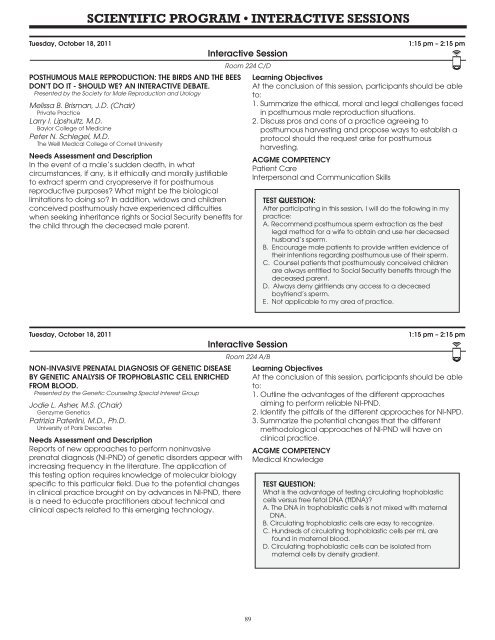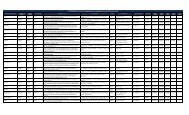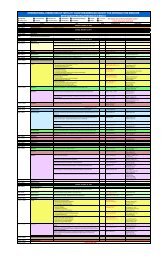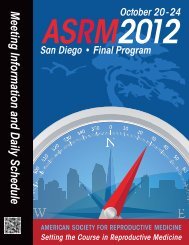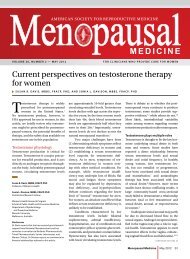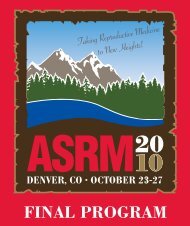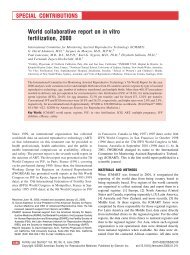scientific program • symposia - American Society for Reproductive ...
scientific program • symposia - American Society for Reproductive ...
scientific program • symposia - American Society for Reproductive ...
You also want an ePaper? Increase the reach of your titles
YUMPU automatically turns print PDFs into web optimized ePapers that Google loves.
SCIENTIFIC PROGRAM <strong>•</strong> INTERACTIVE SESSIONS<br />
Tuesday, October 18, 2011 1:15 pm – 2:15 pm<br />
Interactive Session<br />
POSTHUMOUS MALE REPRODUCTION: THE BIRDS AND THE BEES<br />
DON’T DO IT - SHOULD WE? AN INTERACTIVE DEBATE.<br />
Presented by the <strong>Society</strong> <strong>for</strong> Male Reproduction and Urology<br />
Melissa B. Brisman, J.D. (Chair)<br />
Private Practice<br />
Larry I. Lipshultz, M.D.<br />
Baylor College of Medicine<br />
Peter N. Schlegel, M.D.<br />
The Weill Medical College of Cornell University<br />
Needs Assessment and Description<br />
In the event of a male’s sudden death, in what<br />
circumstances, if any, is it ethically and morally justifiable<br />
to extract sperm and cryopreserve it <strong>for</strong> posthumous<br />
reproductive purposes? What might be the biological<br />
limitations to doing so? In addition, widows and children<br />
conceived posthumously have experienced difficulties<br />
when seeking inheritance rights or Social Security benefits <strong>for</strong><br />
the child through the deceased male parent.<br />
NON-INVASIVE PRENATAL DIAGNOSIS OF GENETIC DISEASE<br />
BY GENETIC ANALYSIS OF TROPHOBLASTIC CELL ENRICHED<br />
FROM BLOOD.<br />
Presented by the Genetic Counseling Special Interest Group<br />
Jodie L. Asher, M.S. (Chair)<br />
Genzyme Genetics<br />
Patrizia Paterlini, M.D., Ph.D.<br />
University of Paris Descartes<br />
Needs Assessment and Description<br />
Reports of new approaches to per<strong>for</strong>m noninvasive<br />
prenatal diagnosis (NI-PND) of genetic disorders appear with<br />
increasing frequency in the literature. The application of<br />
this testing option requires knowledge of molecular biology<br />
specific to this particular field. Due to the potential changes<br />
in clinical practice brought on by advances in NI-PND, there<br />
is a need to educate practitioners about technical and<br />
clinical aspects related to this emerging technology.<br />
Room 224 C/D<br />
89<br />
Learning Objectives<br />
At the conclusion of this session, participants should be able<br />
to:<br />
1. Summarize the ethical, moral and legal challenges faced<br />
in posthumous male reproduction situations.<br />
2. Discuss pros and cons of a practice agreeing to<br />
posthumous harvesting and propose ways to establish a<br />
protocol should the request arise <strong>for</strong> posthumous<br />
harvesting.<br />
ACGME COMPETENCY<br />
Patient Care<br />
Interpersonal and Communication Skills<br />
TEST QUESTION:<br />
After participating in this session, I will do the following in my<br />
practice:<br />
A. Recommend posthumous sperm extraction as the best<br />
legal method <strong>for</strong> a wife to obtain and use her deceased<br />
husband’s sperm.<br />
B. Encourage male patients to provide written evidence of<br />
their intentions regarding posthumous use of their sperm.<br />
C. Counsel patients that posthumously conceived children<br />
are always entitled to Social Security benefits through the<br />
deceased parent.<br />
D. Always deny girlfriends any access to a deceased<br />
boyfriend’s sperm.<br />
E. Not applicable to my area of practice.<br />
Tuesday, October 18, 2011 1:15 pm – 2:15 pm<br />
Interactive Session<br />
Room 224 A/B<br />
Learning Objectives<br />
At the conclusion of this session, participants should be able<br />
to:<br />
1. Outline the advantages of the different approaches<br />
aiming to per<strong>for</strong>m reliable NI-PND.<br />
2. Identify the pitfalls of the different approaches <strong>for</strong> NI-NPD.<br />
3. Summarize the potential changes that the different<br />
methodological approaches of NI-PND will have on<br />
clinical practice.<br />
ACGME COMPETENCY<br />
Medical Knowledge<br />
TEST QUESTION:<br />
What is the advantage of testing circulating trophoblastic<br />
cells versus free fetal DNA (ffDNA)?<br />
A. The DNA in trophoblastic cells is not mixed with maternal<br />
DNA.<br />
B. Circulating trophoblastic cells are easy to recognize.<br />
C. Hundreds of circulating trophoblastic cells per mL are<br />
found in maternal blood.<br />
D. Circulating trophoblastic cells can be isolated from<br />
maternal cells by density gradient.


